This article provides a comprehensive overview of Prof. Raphael Nyarkotey Obu’s contributions to the field of natural medicine literature, particularly focusing on his book “Medical Negligence and The Law in Ghana and The Gambia.” Here are some key points:
1. Author’s Background: The article outlines Prof. Nyarkotey’s diverse background, encompassing expertise in naturopathy, law, and academia.
2. Book Overview: It highlights the key themes and chapters of the book, which delve into topics such as medical negligence, the Bolam principle, complementary and alternative medicine, chiropractic care, and the spirituality of drugless healing.
3. Legal Framework and Case Studies: The article discusses how the book examines legal frameworks surrounding medical negligence, citing notable cases and legal principles such as the Bolam Test and the Montgomery v Lanarkshire Health Board judgment.
4. Writing Style and Impact: The article praises the author’s writing style, describing it as clear, colloquial, and humorous. It suggests that Prof. Nyarkotey’s book appeals not only to legal professionals and academics but also to a broader audience, including laypeople.
5. Contribution to Scholarship: The article acknowledges Prof. Nyarkotey’s significant contribution to scholarship in the field of natural medicine in Ghana and Africa, particularly in bridging the gap between legal and medical perspectives.
Overall, the article below provides a positive assessment of Prof. Nyarkotey’s work, emphasizing its academic rigour, readability, and relevance to both legal and medical communities.
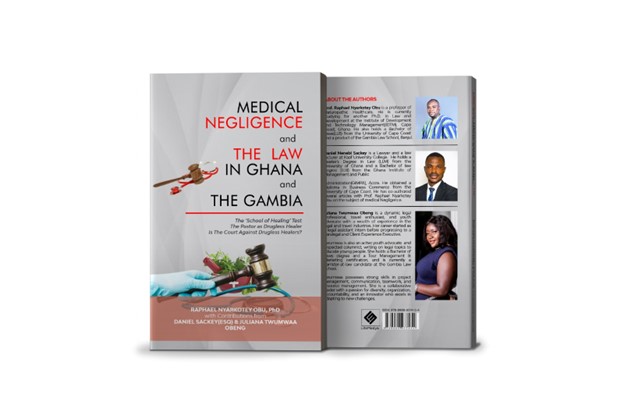
For the past year, Prof. Raphael Nyarkotey Obu, Professor of Naturopathy, Author, Medical Journalist & Columnist who also had his legal training at the Gambia Law School, Banjul, and currently pursuing another Doctor of Philosophy(Ph.D) in Law and Development at the Institute of Development and Technology Management(IDTM), affiliated to the University of Cape Coast, Ghana, has speedily enriched the natural medicine literature by writing six important and interesting books including the literature of natural medicine Law and Negligence.
These are Medical Negligence and The Law in Ghana and The Gambia; Life in The Gambia: Tales from a Professor and an Aspiring Barrister; African Naturopathy, Prayer as Complimentary Medicine: How Much We Know? From the pulpit to Scientific Exploration, Modern Naturopathic Medicine Development in Ghana, The Law and Naturopathic Medicine Practice in Ghana, and The Regulatory Framework of Traditional Medicine in the Gambia.
Medical Negligence and The Law in Ghana and The Gambia, this Review’s subject matter, was written to mark the Nyarkotey 2nd Public Lecture and Book Launch. According to him, this launch’s theme is: “Contributions of Herbal Medicine in the Ghanaian Healthcare Sector.”
“. . . The questions that should be moulded and shaped to meet the needs and opinions of today” are:
1) what is the state of negligence in the natural healthcare profession? And
2) And is the court biased toward practitioners in the drugless industry?
To answer the above concerning negligence, the court does not have a different test. Still, it holds all medical practitioners of all fields to the same standard as medical men and, on some occasions, their colleagues in the same industry.
It may be rightly said that, to a large extent, he, despite odds and stressful circumstances, has succeeded in moulding a considerable branch of the law to suit the Legal, Medical, social, and economic needs of our century, Ghana.
This book has five chapters and is centred on medical negligence in the healthcare sector as well as in the trade of natural healthcare. You will also understand the doctrine in the Bolam principle, commonly known as the Bolam Test: “A doctor is not guilty of negligence if he has acted in accordance with a practice accepted as proper by a responsible body of medical men skilled in that particular art.” The author described this as the old Mantra Test.
The key passages from Montgomery v Lanarkshire Health Board [2015] UKSC 11 (11 March 2015) judgment involve what a patient would consider being a material risk: “The doctor is therefore under a duty to take reasonable care to ensure that the patient is aware of any material risks involved in any recommended treatment and of any reasonable alternative or variant treatments. This is what the author treats as the new Mantra Test.
Besides these fundamental cases, as the Lawyers would describe as locus classicus cases, the author would have been incomplete in his work if the book was without mention of the following cases: Candler v. Crane Christmas & Co. [1951] 1 All E.R. 426, C.A. on negligent statements; Bonsor v. Musicians’ Union [1954] 1 All E.R. 822, C.A. on trade union disputes; Conway v. Rimmer [1967] 2 All E.R. 1260, C.A. about Crown privilege; Padfield v. Minister of Agriculture, Fisheries and Food [1968] A.C. 997, C.A. about ministerial discretion; and Schorsch Meier GmbH v. Hennin [1975] 1 All E.R. 152, C.A. about judgments in foreign currency.
On the General law of negligence discussed in chapter one of the book, the learned author traces its history and comments that this is the area of the law that twentieth-century and twenty-first-century judges have done well to develop most. Donoghue v. Stevenson apart, Prof. Nyarkotey has also, well in discussing the principle of negligent statements in the famous decision in Candler’s case, which was approved by the House of Lords in Hedley Byrne & Co. Ltd. v. Heller & Partners Ltd. [1964] A.C. 465.
In Complementary and Alternative Medicine to the Tort of Negligence (Chapter Two), expressing the same elements, the author provides readers with an understanding and the Legal definition of Traditional and Alternative Healing, The Burden of Proof in drugless healing, The School of Healing Test and its consequential question of discrimination against the Traditional healers, the author went on to suggest the Courts Determination the School of Healing Test, again “The school of healing rule is not sacrosanct”. The question the author posts here is, Should the court abandon the School of Healing test?
The author of this chapter wrote succinctly on the drugless healer’s duty to advise the patient and the drugless healer’s liability when an expert witness disagrees. Finally, Medical Doctors practice Alternatives. The established principles of practice for the guidance of its members concerning methods, diagnosis, and remedies, which each member is supposed to adhere to, had been decided by the court in Nelson v. Harrington (1888), and this, the author emphasized in page 137 of this main edition. With many other cases of law to the emphasis the author referred us to the case of McPeak v. Vanderbilt University Hospital, the case in the court suggests a wide range of alternative treatments. Therefore, in our jurisdictions like “Ghana and Gambia” which is the pivot of the title of this book is the traditional medicine treatment that Medical Doctors in substantive medical centres should rely on. It is vitally clear that the book emphasizes medical negligence to include liability against the traditional medical practitioner who, under his practice, owes standard care.
Chiropractors and Negligence is the main topic for Chapter Three. According to Prof. Nyarkotey, the main consideration is the “interest” of the traditional and alternative medical systems apart from the standard medical systems, all providing different healthcare services to restore the “patient”. The Author points out the rising cases of medical negligence or malpractice found in all the medical systems under a duty of care and causation. Apart from that, the Learned Author is not only simplistic in Language, but his writing style alone will cause no eye to wink when reading through the maiden book ever written from the Western views to the African views by laying emphasis that all fields of the practice are the application of the general negligence theory.
From the language to the style, the Author took time to build the history of Chiropractic, giving it a clear definition to authorities. Emphasizing Walkenhorst v. Kesler, the position of the law in Chiropractic has been simplified with further cases like Lowman v. Kuecker, a case that held that “…. the practice of chiropractic is the practice of medicine”. The author, in his writing up, applied the cases of Maryland Casualty Company v. Hill, Willette v. Rowekamp, Cucchiara v. Funicelli, Yagodinski v. Sutton, Wallace v. La Vine, Janssen v. Mulder, Beech v. Hunter; Nelson v. Dalil; Kuechler v. Volgmann; Treptau v. Behrens Spa; and Kuechler v.Volgnann; Bakewell v. Kahle; Kelly v. Carrol; the author advanced us with more cases to make the book an “Evidence-based book”. See:
Chesney v. People, 121 Colo. 73, 212 P.2d 1011 (1949) (chiropractor);
Ellinwood v. McCoy, 8 CalApp.2d 590, 47 P.2d 796 (1935), (drugless healer); Hardy v. Dahl, 210 N.C. 260
530, 187 S.E. 788 (1936), (naturopath);
Bolles v.Kinton, 83 Colo. 147, 263 Pac. 26, 56 A.L.R. 814 (1929), (osteopathic physicians);
Grainger v. Still,187 Mo. 197, 85 S.W. 1114, 70 L.R.A. 49 (1905), (osteopathic physician and surgeon).
There are many more cases in which the author uses the subject of this book.
Chapter Four deals with the Chiropractor as an Expert Testimony. This is a twofold standard, as the author indicated: “Chiropractors will not be judged the same way as medical doctors because the court recognizes their training regimes to be different from medical doctor training. The author’s emphasis is on the fact that a chiropractor is competent to testify as an expert witness in his special field of medicine. He buttresses his argument in this book with the cases of Alger v. Schine Theatrical Company; Yagodinski v. Sutton; The court in Dickman v. Struble made it clear that the competency of expert witnesses rests largely in the discretion of the trial judge, as seen in the City of Akron v. Public Utilities Commission. Therefore, in Tully v. Mahoning Express Company, a witness seeking to qualify as an expert must first state his education, skills, and experience in the subject area where he is to testify. The praises may be too small, but one cannot escape the author’s sterling knowledge and wide range of discussion in this book on medical negligence.
This Review would be incomplete if the popular case is omitted — Klop v. College of Naturopathic Physicians of British Columbia —. The Learned Author, in this book, clarifies the principle by referring to other cases, i.e. R. v. Javanmardi, Director of Consumer Affairs Victoria v Gibson (No 2) [2017] FCA 366; and in Alfredo Bowman and Dr Sebi LLC v. Michael Jackson [2004].
The principles from the above cases:
“The Healing Power of Nature (Vis Medicatrix Naturae) …
Identify and Treat the Causes (Tolle Causam) …
First Do No Harm (Primum Non Nocere) …
Doctor As Teacher (Docere) …
Treat the Whole Person (Tolle Totum) …
Prevention (Preventare)”
Chapter Five of the book deals with the spirituality of “The Pastor as a Drugless Healer”. The author emphasizes that the reason for this force is that most of them assert that orthodox medicines alone are not enough; they must be supplemented with anointing oils, counselling from pastors, herbal medicines, and other possible solutions. The Author again applied the cases of Nally v. Grace Community Church, 253 Cal. Rptr. 97 (1988), which was decided to address the “clergy malpractice,”
Apart from the main theme of law reform, Medical Negligence and The Law in Ghana and The Gambia have other attractions. The language and style in which the story is clothed are worth noting. In simple, clear, and colloquial language, the great Author can state the law in a way that the layman can understand. In his staccato and laconic style, he tells the world his views on Medical Negligence as it is for now and as it should be in the future.
Humour comes next. It is not only what matters but how to say it. Prof Nyarkotey is aware of this, and in his book, he expresses humour in writing as he does in his speech. Some critics comment on the book on Medical Negligence and the Law in Ghana & The Gambia. it is observed, “His reputation is founded on a rare combination of intellectual brilliance, a vivid speaking and writing style, and an unquenchable zest for reforming the law. Prof. Nyarkotey’s book reflects these qualities.” he describes the book as “an ebullient, readable and vigorous defence of his judicial career . . .”
For the law student, the academic lawyer, the practitioner of Law, the practitioner of medicine, and the judge, MEDICAL NEGLIGENCE AND THE LAW IN GHANA & GAMBIA should have several attractions. Even the layman may find it fascinating.
Other Legal books by Prof. Nyarkotey on the legal aspect of Naturopathy.
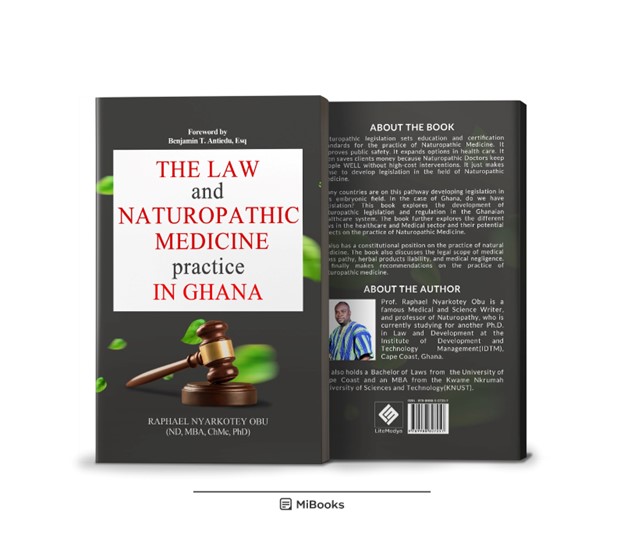
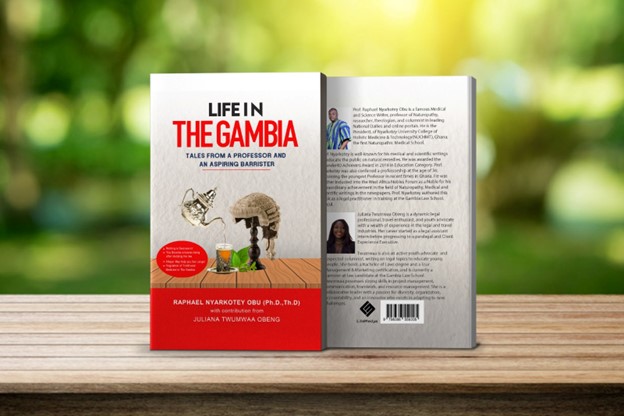
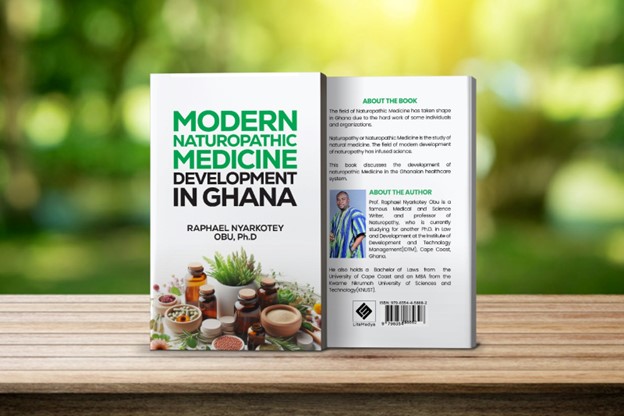
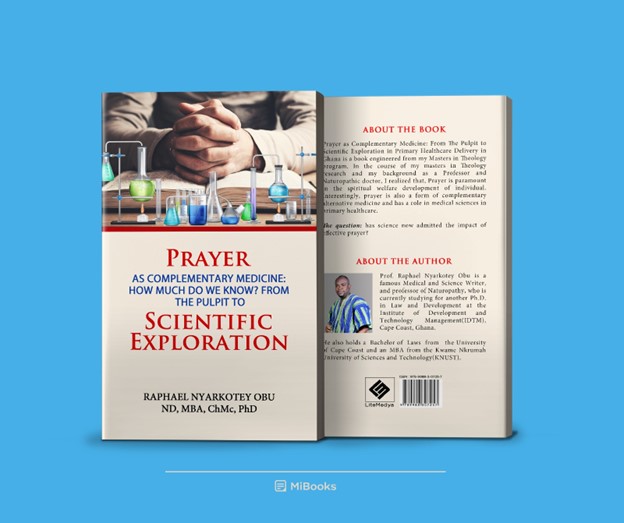
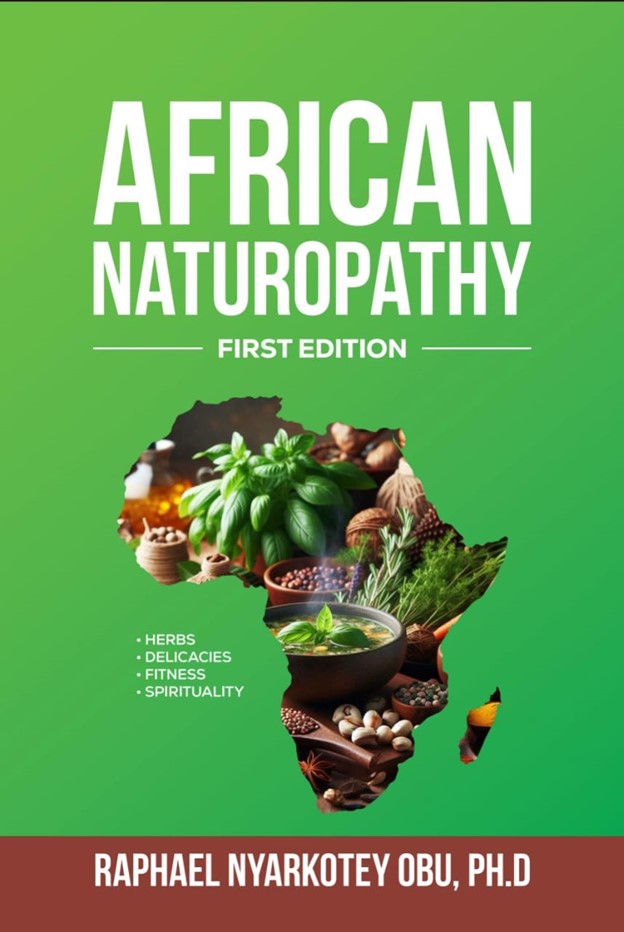
Congratulations on showing academic and legal scholarship in the profession of natural medicine in Ghana and Africa.



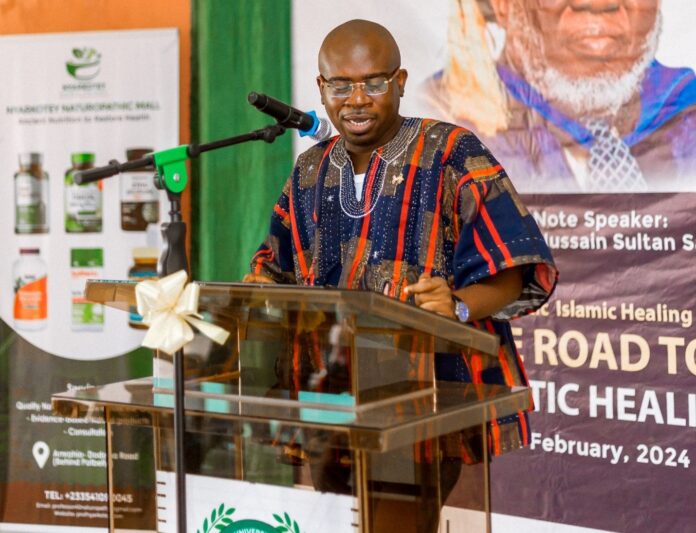












 The African Research (AR) Index is a comprehensive scholarly directory and database focused explicitly on journal publishers that publish and disseminate African research.
The African Research (AR) Index is a comprehensive scholarly directory and database focused explicitly on journal publishers that publish and disseminate African research.

